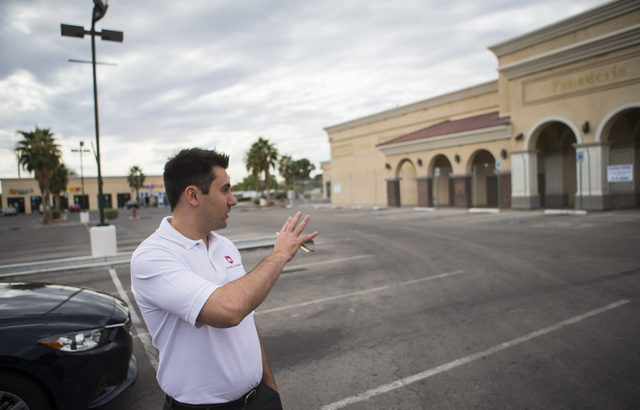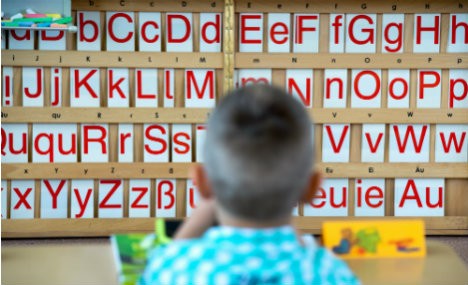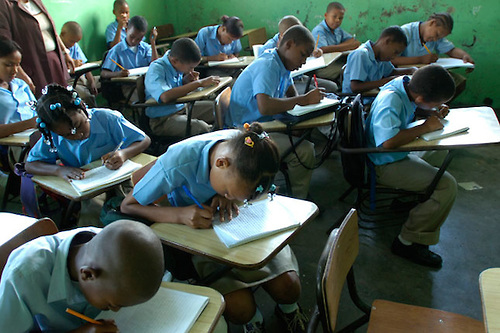Ignacio Prado understands the challenge of receiving a quality education. He came to the United States at 10 years old and sat in classrooms as an English Language Learner. A delay in visa paperwork made him late to college, and he finally graduated at 24. That journey is part of what drives his goal today — to build a K-8 charter school known as Futuro Academy on the east side of Las Vegas. “I don’t have any bitterness or resentment, but I think it adds a lot of texture to how hard it was for me to conclude the process of getting an education,” Prado said.
Up to six underperforming schools will be paired with approved operators in the district, which launches next fall. Prado’s unique proposal would create an entirely new school that could draw students from underperforming areas.
The charter applicants generally share one goal: providing quality education in areas that badly need it. Yet some have faced obstacles in other states — non-renewal of charters, questionable financial transactions, and an executive mired in a sexual harassment scandal. Some of the issues stem simply from education officials trying to weave their way through complex networks and associations.
CELERITY
In California, the Celerity Educational Group operates six charter schools in the Los Angeles Unified School District. But in a move that surprised the group, the school board there recently rejected its renewal for two of those schools, Celerity Dyad and Celerity Troika.
Part of the reason: Celerity “intentionally limits transparency and seeks to subvert oversight,” the Charter Schools Division wrote in a report that recommended the denial. Issues arose as the charter office tried to wade through the relationships between Celerity Educational Group, Celerity Global Development and Celerity Development LLC.
Finance and governance documents that the board requested were either partial or inadequate, according to the report. But those two schools have enjoyed great success in Los Angeles — both have performed better than district and area schools in state assessments, according to the report. Celerity Educational Group is appealing the denial to the California State Board of Education, and also anticipates approval of two new schools in the state, said Regional Vice President Craig Knotts.
Celerity Educational Group and Celerity Global are two separate entities, he explained, although there are contracts between the two for services. In Nevada, the group hopes to bring an individualized learning approach. “We believe that kids, every single child, can achieve at a very high level,” Knotts said. “But in order to achieve at a very high level, they need to be in a nurturing environment with high expectations.”
Celerity has already received a $854,000 federal charter school grant that could boost the creation of the program if approved. Futuro Academy also received about $822,000.
ASPIRA OF PENNSYLVANIA
In Philadelphia, ASPIRA of Pennsylvania has been tangled in controversy since a Fox 29 television report revealed that the charter school operator settled a sexual harassment case from one of its employees. Former Chief Academic Officer Evelyn Nunez filed a sexual harassment claim, arguing that she was demoted, in part, because she rejected sexual advances from ASPIRA of PA President Alfredo Calderon, according to Fox 29. Also, two of ASPIRA’s charter schools could close over issues with transparency and financial transactions. Chief Operating Officer Thomas Darden said the organization has brought in a new financial team and is addressing concerns of Philadelphia’s Charter Schools Office.
Some of those issues would not occur in Clark County, Darden explained, because of a different setup. Each ASPIRA school in Pennsylvania contracts individually with ASPIRA of Pennsylvania, which operates as a charter management organization, he said. In Clark County, one local board of trustees would oversee all ASPIRA schools.
In a statement, ASPIRA said it could not discuss details of the sexual harassment matter. “Under Mr. Calderon’s leadership, ASPIRA’s students have made steady academic progress in schools that are better equipped and far safer than ever before,” the statement reads. “What’s more, under Mr. Calderon’s leadership ASPIRA has hired women in key leadership positions throughout the organization, and it has established a strict no-tolerance policy with respect to discrimination of any kind.”
PATHWAYS IN EDUCATION
Pathways in Education hopes to work with students at risk of dropping out. “We really partner with the district to say ‘OK, you’ve got this group of students or student who’s got this issue, or maybe who’s just coming out of the juvenile justice system,” said Cheri Shannon, senior director of charter development. “‘We’ve got a place for them that could get them an education, get them caught up in their credits, and send them back to you.’”
With a high dropout rate, Shannon said the group sees a great need in Nevada — particularly in Clark County. But a previous 2006 audit also questioned financial transactions between Pathways in Education and Options for Youth, both nonprofit charter operators that are run by the family of John and Joan Hall, former California educators. Both are also managed by Pathways Management Group.
The audit, commissioned by the superintendent of public instruction, questioned a $10.8 million donation that OFY gave to Pathways in Education, arguing that it did not spend much of that amount on programs for California youth.
The audit noted that Pathways created a for-profit organization, R3 Learning Solutions, that appeared to be specifically created to use the donation to purchase OFY’s curricula assets. The audit team found no evidence that the purchase occurred, but still expressed concerns. But the entities mentioned in the audit, including the for-profit Opportunities for Learning also run by a Hall family member, are asserting that the audit is incorrect in a legal matter still in the court system, according to Pathways Management Group’s general counsel Gail Cooper.
The audit concluded that the state may have overpaid those groups by over $35 million. Cooper stressed that those entities are separate from anything that would open in Nevada. Applicants chosen on Tuesday will have been through a vetting process that included nine national charter school experts, requests for supplemental information, and interviews, according to Achievement School District Superintendent Jana Wilcox Lavin. She declined to comment on the applicants before they are approved. Achievement schools will be chosen in February.
Tomado de: http://www.reviewjournal.com/news/education/nevada-charter-school-applicants-come-common-goals-and-some-controversies











 Users Today : 0
Users Today : 0 Total Users : 35460017
Total Users : 35460017 Views Today :
Views Today :  Total views : 3418631
Total views : 3418631